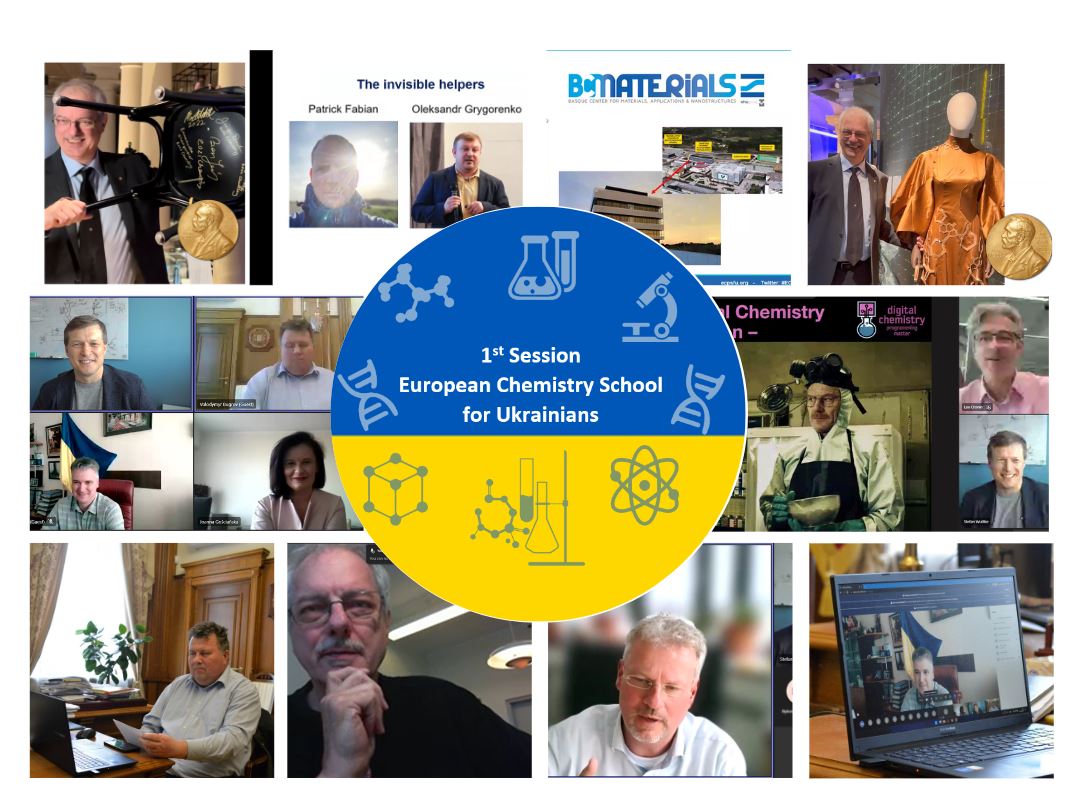European Chemistry School for Ukrainians
1st Session May 4th, 2023
We are excited to announce that the first session of The Chemistry School for Ukrainians was a great success. Over 200 participants from around the world logged on to hear the words of Prof. Dr. Thomas Carell, Nobel Laureate Prof. Dr. Morten Meldal, and Prof. Dr. Lee Cronin.
Prof. Dr. Volodymyr Bugrov, Rector of Taras Shevchenko National University of Kyiv, opened the session with a rousing reminder of the stakes in battle for Ukraine. He told the stories of scientists killed by missile strikes and described the chaos and difficulty of maintaining an orderly university during the war. “We are fighting for our heritage,” he reminded the listeners, largely Ukrainian graduate students and post-doctoral scholars.
Rector Bugrov acknowledged that despite the horrors of battle, the world is pressing forward with scientific discovery and Ukrainians must be ready to meet the challenges of a dynamic workplace. “The demands of the labour market have changed,” and will continue to change, he noted, citing for example recent advances in artificial intelligence. He added that international conferences like this are an important tool in keeping the wealth of Ukrainian research abreast with global advances in the midst of the conflict and will be essential to “rebuild Ukrainian society.”
Prof. Dr. Valentyn Chebanov, Director of Functional Materials Chemistry at the Institute of Single Crystals and Head of The Applied Chemistry Department of Karazin Kharkiv National University, echoed Rector Bugrov’s message, “it is difficult to do science without communication,” he said, even as Ukraine goes through its “most difficult period since independence.” He closed his remarks: “We hope that no missile attack or shelling will interrupt our enjoyment of this event.”
The first keynote speaker of the school was Prof. Dr. Thomas Carell of Ludwig Maximillian University in Munich, who introduced his research on the chemistry of the origins of life. His group, which focuses on the study of nucleic acids, is working to solve the “atmosphere paradox,” searching for answers on how the nucleic acid precursors found on gaseous planets could have been created on Earth, a rocky planet with lots of iron and silicon but very little of the hydrogen, methane, ammonium, and water that have been shown to form complex organic molecules after being blasted with electricity.
Carell was happy to speak in this program and assist the many organizations working to evacuate and support Ukrainian researchers fleeing the war, and proudly announced that his own lab had welcomed a new researcher displaced by the violence. Nonetheless, he recognized that such programs are a “double edged sword,” both protecting those at risk but also draining away Ukrainian’s human resources. “We don’t want Ukraine to lose all of its best people.”
Nobel Laurate Prof. Dr. Morten Meldal of Copenhagen presented his foundational work on click chemistry: “Molecular Click Adventures: A Leap from the Shoulders of Giants.” He interspersed his account of his group’s research with stories and photos of his Nobel Prize reception, including photos of the dress designed to represent his work (which, he noted, had some chemical inaccuracies but which his wife nonetheless requested to wear to the ceremony), the Teflon block made in his neighbor’s garage to run reactions in his lab, and the chair he signed for posterity.
“Freedom is one of the most important things in life. We need to eat, to sleep, and to be free… to think freely about our reality,” said Meldal. He added that chemistry must be taught in schools to the youngest children, lamenting that even in his native Denmark students do not have their first chemistry courses until the eighth grade. Children can begin to understand chemical ideas (even without the equations, models, and “rules” that govern the science) and use them to play and understand the world. Chemistry, Meldal claimed, provides the foundation for understanding climate, financial, and political problems by training rational thinking.
Prof. Dr. Lee Cronin of the University of Glasgow closed the session with an overview of his work on chem-puters. Cronin and his team have developed a new coding language (χDL) designed to conceive, perform, and analyze organic reactions independently using robotic arms in a fume hood (and perhaps most alluringly, to clean itself after every reaction). The program mines the literature for reactions of interest and proposes new reactions that human scientists have never thought to test; to demonstrate the potential of this system, Cronin and his lab wiped the program’s database and it independently “discovered” eight organic reactions that were rewarded with Nobel prizes when discovered by humans. The neural network created by the Cronin lab predates the recent wave of enthusiasm for Artificial Intelligence generated by the popularization of ChatGTP by half a decade.
Cronin emphasized at multiple points during his talk that AI will not replace organic (organic) chemists: “Chemical creativity is always required, AI won’t replace chemists, it will only make them faster.” Technology like this will make chemistry less risky and greener, preventing human exposure to solvents and toxic reagents, and minimize the instances of broken glassware and explosions. But for now, “the human is still better,” he said, adding that the machines are still “very slow, very on fire (well not on fire, we haven’t had any fires yet) but they break all the time.” Despite the setbacks, Cronin’s Lab is plowing steadily toward fully automated total synthesis methods, and expects that soon chemists will spend more time thinking and programing instruments instead of working in fume hoods.
When asked about his goals and the challenges he faced, he replied simply, “When the world is growing crazy, just keep dreaming about the science.”
Written by Madeline Walden
Photo Collage by Orysia Zaremba


